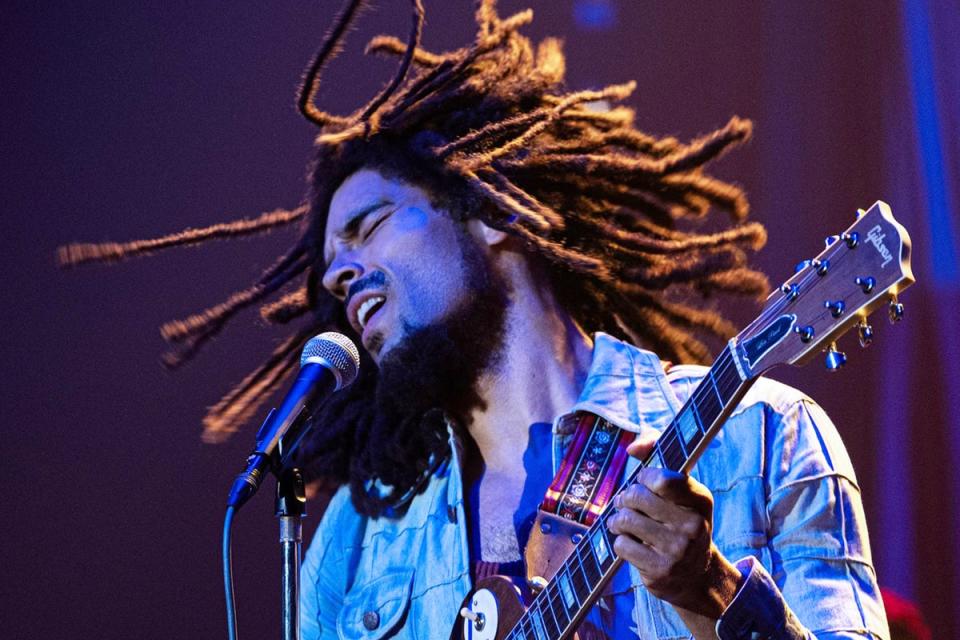Bob Marley: One Love review – yet another watered-down celebrity biopic

With Bob Marley: One Love, Hollywood has proven once again that even the most radical of lives can be watered down into a conventional biopic. Here is an unfalteringly respectful film, made with the full cooperation of the reggae icon’s family, that argues for its subject’s genius without embodying it. It does dodge some of the genre’s pitfalls, but careens mindlessly into others. Marley, as played by Kingsley Ben-Adir, is presented as a centrifugal force in Jamaican art, culture and political thought, but the film also threatens to flatten him into just another tortured male genius.
In Reinaldo Marcus Green’s last film, the Oscar-nominated King Richard, the director granted a flawed nobility to Venus and Serena Williams’s father, a man who failed to capitalise on his own greatness, so instead sought it out in his children. Marley is less narratively simple. Yet One Love, somehow, still acts as if it needs to assure us of the man’s significance – the opening titles proclaim he “rose from the humblest of beginnings,” and Kris Bowers’s score is filled with unnecessary orchestral flourishes.
One Love starts with the assassination attempt on Marley’s life in 1976, at a point where his success had unavoidably pulled him into Jamaica’s political strife, a lingering malaise left by its recently vanquished British rulers. He left for London, where he recorded the album Exodus, before returning to Kingston to hold the One Love Peace Concert in April 1978 – a moment that would work perfectly as a climax, yet the film ends before a single note is played.
Green, at least, doesn’t shy away from Marley’s Rastafari ideology, with its Afrocentric promotion of unity and the existence of a godliness within each of us. One Love feels the most like a Bob Marley biopic when it simply observes how those beliefs manifested – that genial clarity that gave his music power (Ben-Adir’s vocals are blended, not too distractingly, with Marley’s), and compelled others to organise around him. The jam sessions are the film’s best scenes, as we watch Marley and “the Wailers”, his band, construct the title track of Exodus in his living room. Green lets the camera roam, in a way that’s far more effective than the more strained, traditional stage sequences.
Ben-Adir has his own magnetism, and he can play Marley well as a kind of accidental prophet. But he’s also an actor who operates with a palpable sense of control – and while it helps to nail down the particularities of the musician’s Jamaican patois, or how he’d hold his hands in conversation, it was more naturally suited to the role of Malcolm X in Regina King’s One Night in Miami than it is here. There’s a lack of pure intuition, of what it’s like to watch Marley lost and liberated by his music, spinning like a firework across the stage.

Elsewhere, a script credited to four people – Green, Terence Winter, Frank E Flowers and Zach Baylin – relies too heavily on flashbacks and wastes Lashana Lynch in the role of Marley’s wife, Rita. In one scene, she confronts him about his extramarital dalliances and weakness for the cheap pleasures of fame and fortune, which the film has until now failed to inform us about. But it’s the sort of scene we’re meant to expect from a biopic. One Love, it seems, simply forgets that Marley deserves better.
Dir: Reinaldo Marcus Green. Starring: Kingsley Ben-Adir, Lashana Lynch, James Norton, Daniel Melville Jr, Sevana, Hector Lewis, Tosin Cole. 12A, 104 minutes.
‘Bob Marley: One Love’ is in cinemas from 14 February


